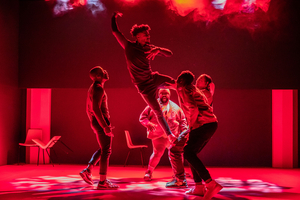Review: FOR BLACK BOYS WHO HAVE CONSIDERED SUICIDE WHEN THE HUE GETS TOO HEAVY, Royal Court
Ryan Calais Cameron’s poetic exploration of black masculinity

![]()
Transferring from a sold-out run at the New Diorama to the Royal Court, Ryan Calais Cameron's play For Black Boys Who have Considered Suicide When the Hue Gets Too Heavy uses episodic storytelling to deconstruct modern black masculinity.
Whilst its stories are connected with a thematic nexus, and brought to pulsating life beat by beat through poetry and dance, these stories never become more than the sum of their parts, despite the rambunctious energy of its performers.
Swirling through themes of love, religion, fatherhood, violence, sexuality, and death, six black men share stories in what appears to be a therapy session, brought to life through multi-roling, poetry, song, and dance. What they are examining is the discord between expectations of being a black man and the reality of their lived experience, a theme rarely explored on stage.
Mark Akintimehin's nameless character (referred to as Onyx in the script) embodies this discord the most. As a self-proclaimed "badman", his mentality as a stoic solider who restrains himself from indulging emotions is at odds with fundamental human experiences. He delivers abrasive insults to the other nameless characters, but this anger is deflecting away from his inner turmoil. He cannot open himself up to love, terrified of becoming vulnerable. His tough-guy persona is adopted as a rug to sweep insecurities underneath until, as title suggests, the hue gets too heavy.
The same is the case for Darragh Hand's character's overconfidence when it comes to women, a mask for his fear of commitment and intimacy, or Nnabiko Ejimofor's character's need to repress his homosexuality. Each performance is anchored by boundless energy and dedication. Each story and traumatic experience is handled with sensitivity and devotion. But they are all also able to find moments of comedy and elation, deftly mocking cheap chat-up lines or breaking out into infectiously exuberant songs.
Directing alongside with Tristan Fynn-Aiduenu, writer Ryan Calais Cameron's script is courageous to tackle such demanding themes in a loving and conscientious way. His poetry is light and playful even when it examines heavy themes and visceral trauma. Thanks to movement director Theophilus O. Bailey-Godson, the dance and movement sequences are exquisitely crafted to translate subdued trauma into catharsis, and make for the most poignant moments of the play.
But without a narrative arc, the play is never capable of penetrating the surface of these stories and the unravelling of each persona never reaches an emotional climax beyond what is presented to the audience. In disavowing a traditional narrative, the play risks limiting its ability to fully untangle its complex emotions and questions.
The show is theatre as a meditation, variations on a particular theme. In this case that theme - disentangling black masculinity - has been long overdue for exploration on stage. But the play just misses out on being truly brilliant by its lack of concrete narrative, despite the powerful creative vision and strong performances.
For Black Boys Who have Considered Suicide When the Hue Gets Too Heavy plays at the Royal Court until 30 April.
Photography by Ali Wright
Reader Reviews

Videos

